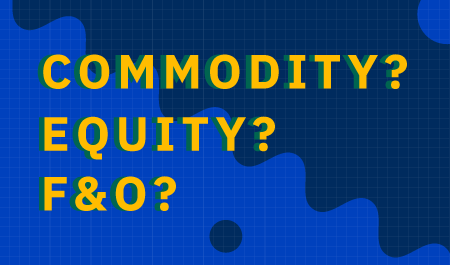What should I invest in? Equity/F&O/Commodity?

As a trader, you have a wide choice of asset classes to trade in the Indian capital markets. You can trade equities, futures, options, commodities, and even currencies. Quite often traders and investors are confused: if gold prices are expected to go up, should I ** buy gold bonds**, gold futures or Titan in the equity markets? If the interest rates are headed down, should I buy interest rate futures or should I buy stocks of banks and realty sector. Here is how you can go about deciding which class of asset to invest in:
When to invest in equities
As a trader or an investor, you would normally invest in equities if you want to take lower market risk and want to hold on to the stock. A lot of investors are quite particular about having ownership of the stock in their ** demat accounts** and for them, equity investing is the right choice. Equity also works well for those looking at long-term capital appreciation or regular dividend income. For most investors or traders who are starting out, equity trading is a good way to start off and understand the market thoroughly before shifting to other asset classes.
When to trade in futures and options
Futures and Options (F&O) can be used to replicate cash market positions. You can pay a margin and buy the stock in futures or you can pay the premium and buy a call option. Either way, your payoffs will be approximately similar. However, futures entail leverage and options entail sunk cost... so you need a higher level of expertise. Futures and Options are useful if you are holding the stock and want to hedge your risk. Options can also be used to create limited risk strategies like protective puts, covered calls, strangles, spreads etc. In fact, Options are a much better way to play the volatility in the market.
When to invest in commodities
There is a lot more of economics involved in commodities and it is ideal for those who have some serious commodity expertise. It can be as part of your profession or as a trader, but in-depth knowledge of the demand and supply dynamics of commodities are critical. You can take positions in commodities when you are playing for commodity prices’ movements. Commodities are also useful for businesses for hedging their business risk. One advantage you have in commodities trading is that you get a much better leverage and also, the volatility is lower.
When to trade in currency futures
You can now trade currency futures and options on the NSE and the BSE with your existing trading account itself. It is basically meant to hedge currency risk but you can also trade currencies here. For example, if you expect the UK Pound to weaken due to BREXIT, you can sell GBP-INR futures and benefit when the price goes down and the Pound weakens. Normally, companies with export/import commitments are regular users of the currency futures to hedge their risk. Even if you are an individual, if your child is studying abroad and you need to remit foreign exchange, you can protect you risk through currency futures. Here is how it works: if your daughter studies in London and you need to remit Pounds each month, you can buy GBP-INR futures at a lower price and keep rolling it over each month. That way you are protected against any vagaries in the Pound movement. It makes your cash flows more predictable.
The bottom line is that you must decide on the actual product to trade, based on your actual need. Choosing the right product can go a long way in enhancing your trading performance.